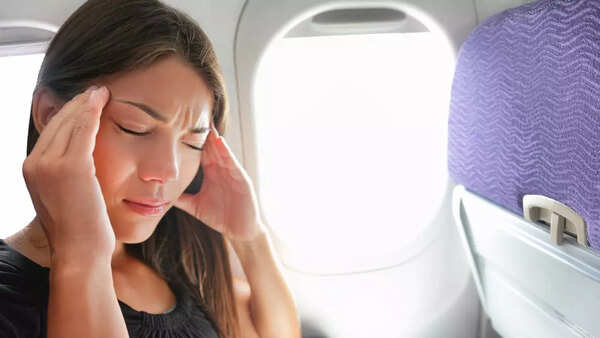
Ever felt queasy on a winding mountain drive or dizzy during a boat ride? You’re not alone. Motion sickness is the unwelcome travel companion that can turn an exciting journey into a miserable experience.
It strikes when your brain gets mixed signals from your eyes, ears, and body confusing motion for danger. The result? Nausea, headaches, cold sweats, and an urgent wish to get off the ride. But don’t cancel your travel plans just yet. With the right know-how and a few smart tricks, you can keep motion sickness at bay and enjoy your adventure whether you are soaring, sailing, or road-tripping.
What is motion sickness
Motion sickness is a widespread condition that happens when your brain gets contradictory messages about motion and position from your eyes, inner ears, muscles, and joints.
It generally hits when you're stationary but being transported by an outside force—like traveling by car, flying on an airplane, or riding on a boat.Some individuals may even suffer from virtual motion sickness (VMS) during video game play or from the use of virtual reality equipment. While it is not dangerous, motion sickness is very uncomfortable and can intrude on your travel or recreation quality.
Causes of motion sickness
Motion sickness is caused by a conflict between sensory inputs. For instance, while driving in a vehicle:
- Your eyes perceive moving surroundings, which triggers a message to the brain that you're moving.
- At the same time, your inner ear and body might detect stationary status if you're sitting and not actually moving.
- This conflict between senses leads your brain to get it wrong, and that leads to nausea and other bodily reactions.
Common causes include: You can get motion sickness on:
- Car, bus, or train travel
- Flights
- Boat cruises or trips
- Amusement park rides
- Playing video or virtual reality games
Symptoms of motion sickness
Symptoms of motion sickness are mild to severe and may develop gradually or abruptly. These include:

- Nausea and vomiting
- Dizziness or loss of balance
- Headache
- Cold sweats
- Fatigue or drowsiness
- Increased breathing rate or feeling the need for more air
- Excessive salivation
- Irritability in children
Who gets motion sickness most often
Motion sickness is not a certainty for anyone, but there are some people who are more prone to it. Risk factors are:
- Children aged 2-12 years
- People with a family history of motion sickness
- Women with menstruation or pregnancy
People with migraine disorders or those with Parkinson's disease, as well as inner ear illnesses such as BPPV (Benign Paroxysmal Positional Vertigo)
When to worry about motion sickness symptoms
Motion sickness is temporary and harmless in most cases, but frequent or severe symptoms can lead to:
- Dehydration due to excessive vomiting
- Low blood pressure (hypotension)
- Discomfort and distress even after stopping the motion
If they happen without any movement or last longer than expected, it might be a sign of an underlying condition and needs to be checked by a healthcare professional.
How is motion sickness diagnosed
There is no test for motion sickness. Your doctor will normally:
- Take an in-depth medical history
- Ask questions about symptoms and causative factors
- Do a physical exam, including tests for inner ear or balance problems

Ways to prevent motion sickness while traveling
While motion sickness can't always be avoided, numerous easy measures can minimize symptoms or bring relief:Natural remedies and lifestyle changes:
- Fresh air: Open windows or utilize vents to maximize airflow.
- Visual concentration: Keep eyes on the horizon or stationary objects far away. Do not read or watch screens.
- Rest and relax: Lean back and shut your eyes.
- Ginger tea or candies: Calm the nausea.
- Peppermint: Mints or tea soothe the stomach.
- Wristbands and glasses: Others find relief through acupressure bands or motion sickness goggles.
Controlling virtual motion sicknessIf symptoms are due to VR or gaming, the following may help:
- Take frequent breaks
- Shorten playtime
- Adjust display settings to minimize screen flicker and delay
Can motion sickness be prevented
You may not always avoid motion sickness, but proper planning can significantly reduce your chances.Seating advice for various means of transport:
- Car: Ride in the front passenger seat
- Plane: Sit behind the wing
- Train: Face forward with a window seat
- Boat: Remain in the middle of the ship, preferably on the top or bottom deck
- Cruise ship: Reserve cabins mid-ship and low to the waterline
Prevention tips before travel:
- Eat a light, plain meal beforehand (avoid greasy and heavy foods)
- Drink plenty of water
- Avoid smoking and alcohol
- Do not travel on an absolutely empty stomach, which could worsen symptoms
When should you seek a doctor
Visit a doctor if:
- Symptoms are persistent when at rest
- You have frequent nausea or vomiting
- You are showing signs of dehydration, such as dry mouth, dark-colored urine, or dizziness.

 5 hours ago
50
5 hours ago
50




























 English (US)
English (US)